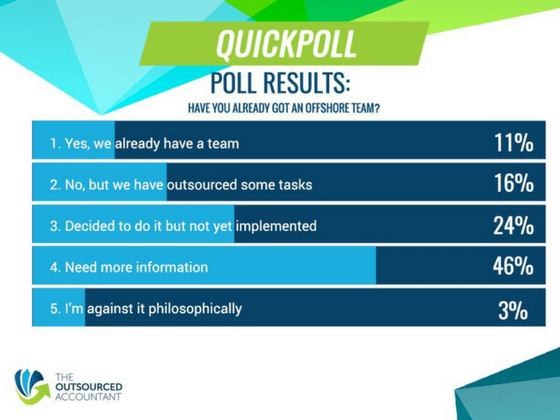Results from a previous poll we did show that 46% of firms need to know more information about outsourcing and its benefits to companies looking to build capacity while only 11% have embraced the concept and already have teams put in place.

Why does outsourcing matter?
Simply put, outsourcing is a viable business strategy that can help firms improve performance. By transferring key tasks to a global offshore team, companies will be able to enhance efficiency and scale their business.
The poll showed that more than 90% of companies either thought about it or have actually engaged in offshoring with the intent to save on costs, improve performance and add more value to clients.
If you’re one of these who are thinking about offshoring and want to do it right, start with these three questions.
How can we streamline our processes and make them more efficient?
Through offshoring, firms are transferring low-impact, repeatable processes from one team to another. Data entry, bookkeeping, tax preparation, and other administrative tasks are just some of the tasks firms can outsource to a global offshore team.
Harnessing the skills and expertise of professionals from a different location, like the Philippines, can dramatically increase your firm’s productivity. Your staff will have a lot more time on their hands to focus on client-facing tasks.
Offshoring will improve efficiency because global offshore teams are equipped with the necessary technology to automate tasks. They are also highly professional and can be relied to handle the job well.
Here are the top 5 things you need to know about the Filipino staff.
Firms will start to have more real-time accountants. They will be able to communicate more regularly with clients to enquire about their needs and, more importantly, offer financial advice.
The impact to service and productivity of offshoring can be tremendously beneficial. Firms can build trust with clients, which often leads to getting more work. They can generate more leads and get more referrals.
Here’s TOA Chairman, Nick Sinclair, on the benefits of offshoring to the company.
“All the mess got cleaned up, it enabled our team to be freed up. They went looking for more work, being proactive and focusing on outcomes that were much more valuable to the client.”
How can we deliver more for less?
Companies offshore mainly to save on costs. But the benefits are wide-ranging. For firms looking to solve capacity issues, offshoring can provide that. But take note that it is a long-term play.
Approximately more than 70% of firms are trying to solve capacity issues by attempting offshoring but it’s taking them too long to get setup while others are not doing it right. As a result, efficiency doesn’t improve.
Setting up a global offshore team will allow firms to deliver more to clients so they can focus on growth services. There are considerable benefits to having an offshore team. The first one is cost-savings. Firms will have 89% savings on an accountant and 88% savings on bookkeepers, according to our data. Savings like these will help firms have more profit margins.
How can we attract more clients?
Firms that show they have the capacity to take on the work required will gain the confidence of clients. This will lead to more work and can land referrrals.
Furthermore, client needs are evolving. They want real-time accountants. They want more regular communication. They want real-time access to data. They want to be aware of what’s happening with their business. They want accountants to continually reach out to them and to provide updates.
Satisfying these needs will lead to client loyalty. This means you’ll retain clients longer and through continuous delivery of high-value services, you can get more referrals.
- Match the right talents with the right tasks to ensure all work is accomplished well, which leads to improved productivity and efficiency.
- Use available technology to automate tasks.
- Put systems in place for process-driven work.
- Standardise processes and workflows.
- Be proactive and communicate more with clients.
- Establish a culture that will inspire and motivate your staff.
- Continuously add value to the services you offer.
Conclusion
There are considerable benefits to offshoring. By outsourcing certain tasks, firms will be able to build capacity and enjoy bigger profit margins.
Key takeaways:
- A significant number of firms are already thinking about and/or already exploring offshoring but are either doing it wrong or need more information on how to do it.
- Offshoring will help firms streamline services and improve efficiency in the long run.
- Offshoring has tremendous benefits to service and productivity. It will help you build trust which leads to more work.
- Firms can deliver more for less costs. Firms can have as much as 89% savings by creating global offshore teams.
- Successful offshoring can deliver more business.
If you are an accountant, bookkeeper or finance firm and looking to solve capacity restraints, call our offshoring specialists at 1300 896 522.

















